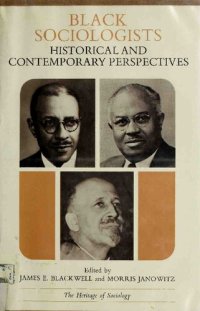
Ebook: Black Sociologists: Historical and Contemporary Perspectives
Author: James E. Blackwell, Morris Janowitz
- Genre: Other Social Sciences // Sociology
- Series: The Heritage of Sociology
- Year: 1974
- Publisher: University of Chicago Press
- Language: English
- pdf
This work is an assessment and interpretation of the contributions of black sociologists to the development of the discipline of sociology—contributions which were made under unusual circumstances and despite the persistent barriers of academic segregation, discrimination, isolation, and patterned exclusion. The volume was an intended outcome of a national conference convened by the Caucus of Black Sociologists and the University of Chicago in 1972 to study and call attention to the rich intellectual heritage of black sociologists. The contributors to the work, all participants at the National Conference, were selected on the basis of their academic achievements and knowledge about the world of sociology.
Black Sociologists is divided into five parts which approximate the periods in the history of black sociologists in America. The first section, concerning the period of the founding, is addressed to the works of the three men who dominated the period and whose studies have been the foundation for much additional research: W. E. B. DuBois, Charles S. Johnson, and E. Franklin Frazier.
Part Two deals with the institutionalization of the work of black sociologists. It examines the largely segregated milieu in which most black sociologists have labored, and the unheralded contributions of such men as Reid, Cox, Chivers, and Gomillion. The essays explore the limited opportunities for professional training and academic development available to these men, as well as their responses of protest to conditions in the larger society. It is also noted that despite the handicaps of limited access to scholarships or grants, there were a number of dynamic centers of sociological training and research among both predominantly black colleges and white institutions.
In the third section, "The Contemporary Setting," the subject is the dimensions and limits of professionalization for black sociologists in a period of changing opportunities and resources. The essays here describe socioeconomic characteristics of black sociologists, and the impact of the political and social climates on their personal orientations in sociology.
The next section addresses a number of intellectual dilemmas among contemporary black sociologists. For example, is there one sociology or both a black and a white sociology? Do those who claim to be "insiders" have preemptive claims over those identified as "outsiders" in the study of any group of people?
The final section of the volume returns to the institutional setting of contemporary sociology. Controversial materials are presented in essays which examine the tensions generated by black studies on the corporate life of American universities and, finally, the role in which black sociologists have operated in the American Sociological Association.
Black Sociologists is divided into five parts which approximate the periods in the history of black sociologists in America. The first section, concerning the period of the founding, is addressed to the works of the three men who dominated the period and whose studies have been the foundation for much additional research: W. E. B. DuBois, Charles S. Johnson, and E. Franklin Frazier.
Part Two deals with the institutionalization of the work of black sociologists. It examines the largely segregated milieu in which most black sociologists have labored, and the unheralded contributions of such men as Reid, Cox, Chivers, and Gomillion. The essays explore the limited opportunities for professional training and academic development available to these men, as well as their responses of protest to conditions in the larger society. It is also noted that despite the handicaps of limited access to scholarships or grants, there were a number of dynamic centers of sociological training and research among both predominantly black colleges and white institutions.
In the third section, "The Contemporary Setting," the subject is the dimensions and limits of professionalization for black sociologists in a period of changing opportunities and resources. The essays here describe socioeconomic characteristics of black sociologists, and the impact of the political and social climates on their personal orientations in sociology.
The next section addresses a number of intellectual dilemmas among contemporary black sociologists. For example, is there one sociology or both a black and a white sociology? Do those who claim to be "insiders" have preemptive claims over those identified as "outsiders" in the study of any group of people?
The final section of the volume returns to the institutional setting of contemporary sociology. Controversial materials are presented in essays which examine the tensions generated by black studies on the corporate life of American universities and, finally, the role in which black sociologists have operated in the American Sociological Association.
Download the book Black Sociologists: Historical and Contemporary Perspectives for free or read online
Continue reading on any device:

Last viewed books
Related books
{related-news}
Comments (0)